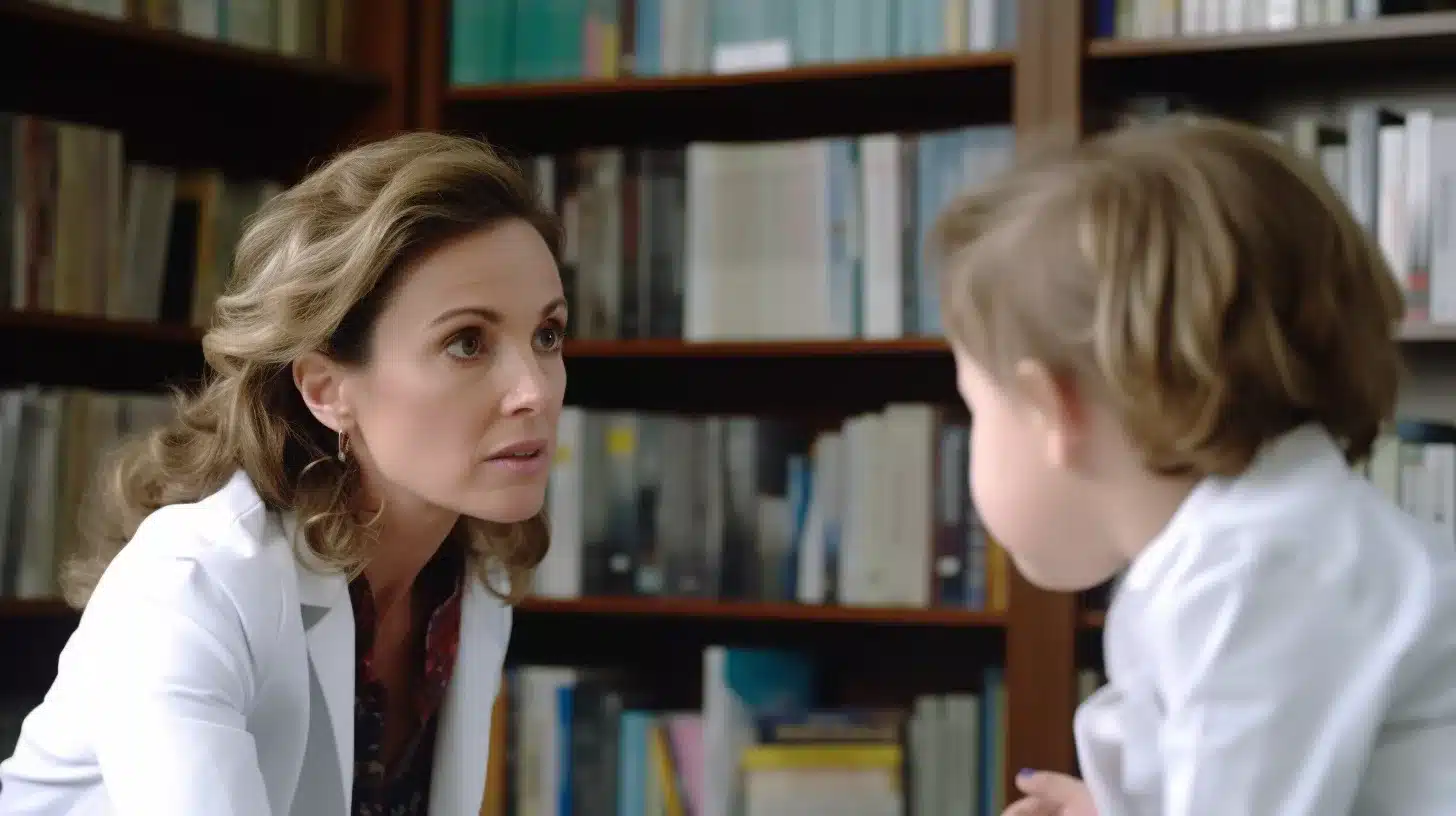One quiet afternoon, I decided to visit the local community library to return some books and spend a bit of time exploring new reads. As I walked through the children’s section, my eyes landed on a familiar figure. It was Anna, a mother of one of my patients, sitting hunched over at one of the small reading tables. Her son, Leo, was sitting nearby, trying to focus on a colorful book, though his eyes kept darting nervously around the room.
“Hi, Anna,” I greeted her softly as I approached.
Anna looked up, her face lighting up momentarily before her expression reverted to one of exhaustion. “Oh, Dr. Priya, it’s nice to see you.” She gestured toward the chair next to her. “Please, sit. I could really use some advice.”
I took a seat across from her. It was obvious Anna had something weighing heavily on her. Leo was a bright, gentle boy, and I had always enjoyed our conversations during his checkups. Today, though, he looked reserved, his small frame hunched over the book as if trying to make himself invisible.
Anna leaned forward, her voice barely a whisper. “Dr. Priya, I’m worried about Leo. He’s been having a really hard time at school lately, and I think he’s being bullied. I don’t know how to help him. He used to love coming here, but now even the library isn’t safe for him.”
What is Bullying and Why Does It Happen?
I gave Anna an encouraging nod. “Anna, I’m so sorry to hear this. Unfortunately, bullying is something that many children face. Studies show that around 50% of children experience bullying at some point, but it’s often something that goes unnoticed or unspoken.”
Anna’s eyes widened as if she couldn’t believe the numbers. “It’s heartbreaking. Leo doesn’t even want to go to school anymore. He keeps making excuses, saying he feels sick every morning.”
“That’s really common in kids who are experiencing bullying,” I said gently. “Bullying isn’t always physical; it can be emotional, verbal, or even take place online. It’s designed to make the person feel powerless or isolated, and that’s why children like Leo often try to avoid school or places where they feel vulnerable.”
Anna nodded, clearly fighting back tears. “Leo is such a kind kid, and he’s always been a little shy. He told me that some of the boys at school have been calling him names and making fun of him for not being good at sports. I just feel so helpless.”
The Forms of Bullying and Their Impact on Leo
“Bullying comes in many forms, Anna,” I explained. “It can be direct, like pushing, hitting, or calling names—what we often picture when we think of bullying. But it can also be indirect, like exclusion or spreading rumors. And these days, children also face cyberbullying, which can happen on social media or through texts.”
Anna sighed heavily. “Leo has always been more interested in books and drawing. He doesn’t really fit in with the sporty kids, and now it seems like that’s making him a target.”
I nodded. “Children who are seen as ‘different’—whether because of their interests, their quiet nature, or even their academic abilities—are often picked on. But I want you to know this isn’t Leo’s fault, and there are ways we can help him feel safer and more confident.”
Signs of Bullying and the Emotional Toll
Anna looked over at Leo, who was now flipping through the pages of his book without much enthusiasm. “He hasn’t been himself lately,” she said, her voice shaky. “He used to love coming here to the library and to school. Now he barely talks, and he just seems so sad all the time.”
“Bullying can have a big impact on children’s emotional well-being,” I said. “It’s not just about what happens at school—it follows them everywhere, even places they once felt safe. Children who are bullied can experience anxiety, depression, trouble sleeping, and even physical symptoms like stomachaches or headaches.
Anna’s eyes filled with tears. “I just want my happy boy back.”
Practical Steps to Help Leo Overcome Bullying
1. Foster Open Communication
“Anna, the first thing you can do is encourage Leo to talk to you about what he’s feeling. It’s important that he knows you’re on his side, and that nothing he says will get him in trouble. Maybe try talking to him at bedtime or during a quiet activity, when it’s just the two of you.”
Anna nodded, “I’ve tried, but he’s scared that if I say anything, it’ll just get worse.”
That’s a valid concern,” I said, “but Leo also needs to know that you can help, and that adults in his life are there to protect him. Let him know that you won’t act without his permission, but that he should feel safe telling you everything.”
2. Build Leo’s Confidence Outside of School
“Leo’s love for books and drawing is a wonderful thing, Anna. Activities like these can be used to help him build confidence and make friends outside of school. Is there a book club or an art class he could join? Having friends in different social circles can really help.”
Anna’s face brightened slightly. “He loves to draw. Maybe finding an art group could help.”
3. Teach Coping Strategies
“Helping Leo learn ways to respond to bullying can also empower him,” I said. “Teach him some simple phrases he can use, like ‘That’s not true’ or ‘I don’t care what you think.’ Practice these at home, so he feels prepared. Also, help him understand that walking away and ignoring the bully is often a powerful response.”
Anna listened intently, “I’ll definitely try that with him. He’s so sensitive—I think it’ll help if he feels like he knows what to say.”
Engaging with the School
“Have you talked to the school yet?” I asked.
Anna shook her head, “I was scared they wouldn’t take me seriously, or that they’d make things worse.”
“It’s important that the school is involved,” I said gently. “Teachers need to be aware of what’s happening so they can help create a safer environment for Leo. Many schools have anti-bullying policies, and they might be able to keep an eye on things or even facilitate positive interactions.”
Parental Advice: Creating a Supportive Environment for Leo
- Listen Without Judgement: Let Leo express his fears and feelings without jumping to action immediately. Sometimes kids need to know they’re heard before they want solutions.
- Encourage New Friendships: Encourage Leo to participate in activities outside of school where he can meet new friends and develop a sense of belonging.
- Avoid Blaming or Overreacting: Remain calm when Leo shares details. Overreacting may make him feel worse or scared to share in the future.
When to Seek Professional Help
“Anna, if Leo continues to struggle, it may be helpful to consider professional help,” I said. “A counsellor or therapist can provide a safe space for him to express his feelings and learn coping strategies.”
Anna wiped her eyes. “Do you really think it could help?”
“Absolutely, Anna. Therapy can be a great tool, especially when children feel overwhelmed or alone. It’s all about providing Leo with the resources he needs to feel strong again.”
Final Thoughts: Leo’s Journey to Healing
We watched Leo from our small library table. He had finally found a book that seemed to catch his interest, and his face lit up with the smallest of smiles.
“Anna, I know this is a difficult time,” I said, “but with the right support, Leo will get through this. He has you by his side, and that’s his greatest strength. You’re doing everything you can, and we will continue to work together to ensure Leo feels safe, heard, and valued.”
Anna smiled at me, a mix of exhaustion and hope in her eyes. “Thank you, Dr. Priya. It helps so much just to have a plan.”
“We’re in this together, Anna. You’re not alone, and neither is Leo. Let’s take it one step at a time.”

FAQs about Childhood Bullying
1. What are common signs of bullying in children?
- Signs may include a reluctance to go to school, frequent complaints of physical symptoms like headaches or stomach aches, sudden mood swings, and loss of interest in activities they once enjoyed.
2. How should I react if my child opens up about being bullied?
- Stay calm, listen without interrupting, and reassure them that it is not their fault. Avoid confronting the bully’s parents directly, and instead, work with school officials.
3. Should I intervene directly with the child who is bullying my child?
- No, it’s usually better to involve the school rather than confronting the bully or their parents directly, as this could escalate the situation.
4. What activities can help a child regain confidence after being bullied?
- Encourage participation in clubs, sports, or other group activities where they can build new friendships and skills. Activities like art, music, or martial arts can help boost confidence.
5. Can professional therapy help my child cope with bullying?
- Yes, therapy can help children process their feelings, develop healthy coping strategies, and rebuild their self-esteem in a safe environment.


